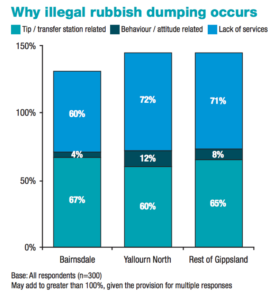Illegal Dumping: Is it deliberate and how do we fix it?
A 2014 Litter Prevention Kit produced by the Victorian Litter Action Alliance (VLAA) and Sustainability Victoria has found that the attitudes and reasons behind illegal dumping of clothing and household items can vary dramatically, with some members of the public completely unaware that their actions are considered an illegal offence against the Environment Protection Authority (EPA). The study measured attitudes on a scale that identified “Super Donators”, citizens who understand acceptable and unacceptable behaviours and who do not leave anything outside of charity stores or beside clothing collection bins; “Well-intentioned Donators”, those who believe that what they leave in front of charity stores outside work hours or beside clothing bins will be sorted in the morning and is of good quality (i.e. not rubbish) so therefore doesn’t fall under the category of dumping; “They’ll Deal With It Donator”, those who will donate when it’s most convenient to them and on occasion will leave broken or damaged goods in their mix of unwanted items; and the “Deliberate Dumper”, members of the public who don’t like paying waste removal fees and will dump in an opportunistic manner. To download the complete VLAA study, click here.
Although illegal dumping can partly be attributed to public attitudes and behaviour, VLAA also looked into additional research conducted in Gippsland, to examine whether other factors could play a crucial role. Through responses gathered in a survey shown in Figure 1, it was found that a strong majority of respondents admitted a lack of waste recovery services in their area and/or expensive tip/transfer fees were to blame for the decision to ‘dump’ unwanted items in and around public spaces.
Figure 1: “Why illegal rubbish dumping occurs“ survey results. Source: Click here (page 4)

Now that we know the reasons behind illegal dumping, how do we fix it?
Local councils are key to this process. They have the ability to facilitate broader community education and engagement, they are an authoritative body that local businesses and community members can trust and they are also equipped with the power to enforce law and order against those who offend to deter undesirable and offensive behaviour.
Local councils should also provide greater infrastructure to make convenient clothing and homewares disposal more accessible to the public (such as clothing drop-off hubs and public recycling events like SCR Group’s Pop-Up Drive Thru Recycling Days or Kerbside Collection Services). For more about best practices in litter prevention, click here.
SCR Group, in partnership with Monash City Council, is conducting further research to create effective and innovative solutions to illegal dumping, assessing trends locally and from around the globe. The results of this project will be made available later in the year.
To learn more about SCR Group and our clothing drop-off hubs and recycling programs, as well as how your council can get involved, click here.
